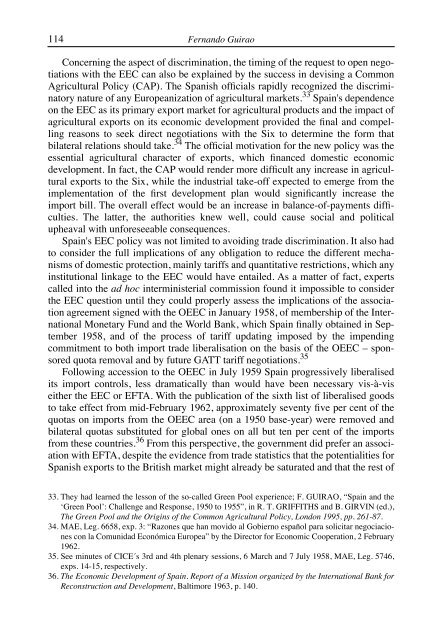Journal of European Integration History – Revue d'histoire de l'
Journal of European Integration History – Revue d'histoire de l'
Journal of European Integration History – Revue d'histoire de l'
- No tags were found...
Create successful ePaper yourself
Turn your PDF publications into a flip-book with our unique Google optimized e-Paper software.
114Fernando GuiraoConcerning the aspect <strong>of</strong> discrimination, the timing <strong>of</strong> the request to open negotiationswith the EEC can also be explained by the success in <strong>de</strong>vising a CommonAgricultural Policy (CAP). The Spanish <strong>of</strong>ficials rapidly recognized the discriminatorynature <strong>of</strong> any <strong>European</strong>ization <strong>of</strong> agricultural markets. 33 Spain's <strong>de</strong>pen<strong>de</strong>nceon the EEC as its primary export market for agricultural products and the impact <strong>of</strong>agricultural exports on its economic <strong>de</strong>velopment provi<strong>de</strong>d the final and compellingreasons to seek direct negotiations with the Six to <strong>de</strong>termine the form thatbilateral relations should take. 34 The <strong>of</strong>ficial motivation for the new policy was theessential agricultural character <strong>of</strong> exports, which financed domestic economic<strong>de</strong>velopment. In fact, the CAP would ren<strong>de</strong>r more difficult any increase in agriculturalexports to the Six, while the industrial take-<strong>of</strong>f expected to emerge from theimplementation <strong>of</strong> the first <strong>de</strong>velopment plan would significantly increase theimport bill. The overall effect would be an increase in balance-<strong>of</strong>-payments difficulties.The latter, the authorities knew well, could cause social and politicalupheaval with unforeseeable consequences.Spain's EEC policy was not limited to avoiding tra<strong>de</strong> discrimination. It also hadto consi<strong>de</strong>r the full implications <strong>of</strong> any obligation to reduce the different mechanisms<strong>of</strong> domestic protection, mainly tariffs and quantitative restrictions, which anyinstitutional linkage to the EEC would have entailed. As a matter <strong>of</strong> fact, expertscalled into the ad hoc interministerial commission found it impossible to consi<strong>de</strong>rthe EEC question until they could properly assess the implications <strong>of</strong> the associationagreement signed with the OEEC in January 1958, <strong>of</strong> membership <strong>of</strong> the InternationalMonetary Fund and the World Bank, which Spain finally obtained in September1958, and <strong>of</strong> the process <strong>of</strong> tariff updating imposed by the impendingcommitment to both import tra<strong>de</strong> liberalisation on the basis <strong>of</strong> the OEEC <strong>–</strong> sponsoredquota removal and by future GATT tariff negotiations. 35Following accession to the OEEC in July 1959 Spain progressively liberalisedits import controls, less dramatically than would have been necessary vis-à-viseither the EEC or EFTA. With the publication <strong>of</strong> the sixth list <strong>of</strong> liberalised goodsto take effect from mid-February 1962, approximately seventy five per cent <strong>of</strong> thequotas on imports from the OEEC area (on a 1950 base-year) were removed andbilateral quotas substituted for global ones on all but ten per cent <strong>of</strong> the importsfrom these countries. 36 From this perspective, the government did prefer an associationwith EFTA, <strong>de</strong>spite the evi<strong>de</strong>nce from tra<strong>de</strong> statistics that the potentialities forSpanish exports to the British market might already be saturated and that the rest <strong>of</strong>33. They had learned the lesson <strong>of</strong> the so-called Green Pool experience; F. GUIRAO, “Spain and the‘Green Pool’: Challenge and Response, 1950 to 1955”, in R. T. GRIFFITHS and B. GIRVIN (ed.),The Green Pool and the Origins <strong>of</strong> the Common Agricultural Policy, London 1995, pp. 261-87.34. MAE, Leg. 6658, exp. 3: “Razones que han movido al Gobierno español para solicitar negociacionescon la Comunidad Económica Europea” by the Director for Economic Cooperation, 2 February1962.35. See minutes <strong>of</strong> CICE´s 3rd and 4th plenary sessions, 6 March and 7 July 1958, MAE, Leg. 5746,exps. 14-15, respectively.36. The Economic Development <strong>of</strong> Spain. Report <strong>of</strong> a Mission organized by the International Bank forReconstruction and Development, Baltimore 1963, p. 140.
















